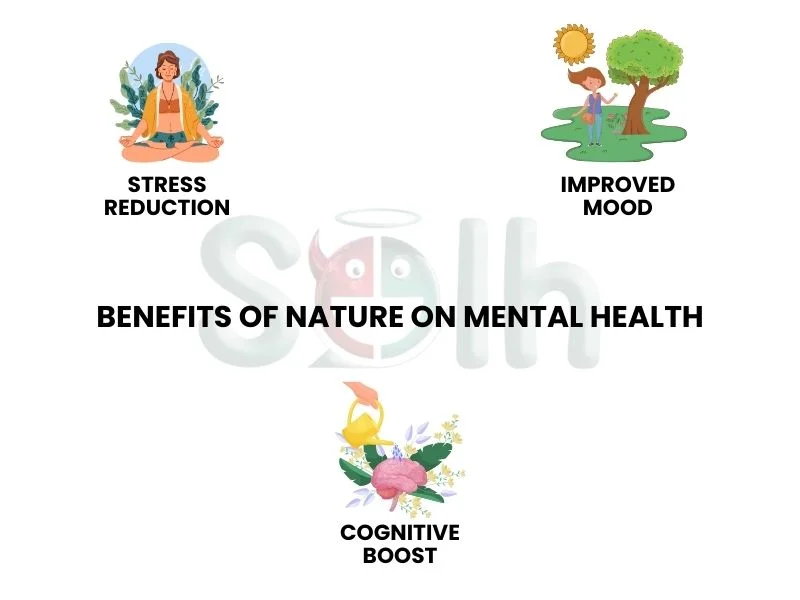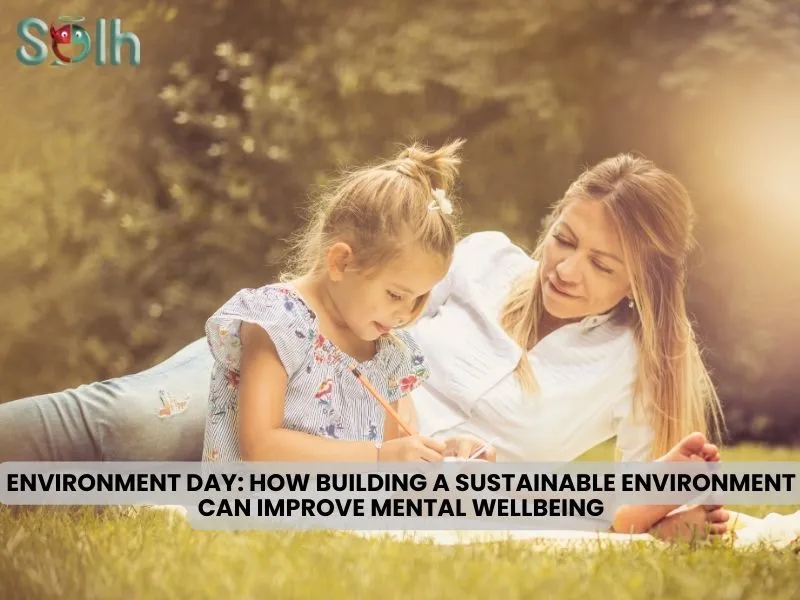You know that feeling of being totally stressed out like your brain is in a million places at once? Well, guess what? Spending time in nature, like chilling in a park or taking a walk in the woods, can actually help! Studies show it can calm you down and make you feel happier. I totally get it. Last week, I was feeling burned out from city life.
So, I packed my sneakers and headed to a nearby park. Just being around all the trees and listening to the birds chirping felt like a weight lifted off my shoulders. It was amazing! This connection we have with nature is pretty cool, right? It makes you realize how important it is to take care of our planet, not just for the environment itself but for our own minds, too.
So, this Environment Day, let's all promise to do our part to protect the Earth. A healthy planet means healthy minds for everyone, including us!
Environment Day, a day to honor our wonderful planet and consider strategies for preserving its health for years to come. Imagine living in a society where we protect the planet without depleting its resources, pretty amazing, huh? Surprisingly, nevertheless, a sustainable future benefits not just the environment but also our mental health! In fact, spending time in parks, woods, or even little green spaces might help us feel happier and less stressed.
So, let's consider more than just recycling and planting trees on this Environment Day. Together, let's create a world that is amazing for the environment and our mental health ! It's true that caring for the environment may improve your attitude. It's accurate!
On this Environment Day, we're concentrating on creating a sustainable future in which we coexist peacefully with the natural world. But helping ourselves is just as important as helping the environment. Being outside in the shade of trees and with clean air is a great way to decompress.
In addition, we feel connected and purposeful when we are a part of something greater than ourselves, like conserving the environment. So, let's create a more sustainable future this year to benefit both the environment and ourselves.
Science Behind the Positive Impacts of Sustainability on Mental Health
There's a reason why spending time outdoors feels good. A growing body of scientific evidence highlights the positive impact of nature on our mental well-being. Let's delve into science and explore the concept of biophilia, our inherent connection to the natural world.
Mental Health Benefits of Sustainable Environment:
Stress Reduction: Studies show that spending time in green spaces lowers stress hormones. Nature seems to promote a sense of calm and peace.
Improved Mood: Immersing yourself in nature can elevate mood and fight symptoms of depression. Exposure to sunlight can also help regulate serotonin.
Cognitive Boost: Nature exposure can enhance focus and attention. Studies suggest it can improve cognitive function and even creativity.

Our Inherent bond with nature
The concept of biophilia suggests that humans have an innate love of nature. This idea resonates with the observed mental health benefits. Here's how biophilia might explain the connection:
Evolutionary Roots: Our ancestors thrived in natural environments, and an affinity for nature may be ingrained in our genes
Sensory Stimulation: Nature provides a rich sensory experience, engaging our senses in a way that reduces mental fatigue and promotes relaxation
Attention Restoration Theory: Our brains are constantly bombarded with stimuli. Nature may provide a restorative environment, allowing our attention to reset.
How Spending Time Outdoors Calms Your Mind
Have you ever noticed how a walk in the park can melt away stress? It's not just your imagination. Science is increasingly revealing how nature benefits mental health. Studies are painting a clear picture: spending time outdoors can significantly reduce stress hormones and anxiety, leaving you feeling calmer and more at peace. Imagine yourself feeling overwhelmed, your mind racing with worries. You take a deep breath and step outside.
The warm sun on your skin, the gentle melody of birdsong, and the rustling leaves swaying in the breeze – it's a sensory shift that instantly feels soothing. Research suggests this experience goes beyond a simple change of scenery.
Studies like the one conducted by Wells et al. in 2003 have found that spending time in green spaces can actually lower the levels of cortisol, a key stress hormone, in our bodies. This decrease in cortisol translates to a physiological shift, promoting a sense of calm and relaxation.
Think of cortisol as the body's internal alarm system. When we're stressed, it goes into overdrive, releasing cortisol to prepare us for a perceived threat. This surge of cortisol can be helpful in the short term, but chronic stress keeps it elevated, leading to a cascade of negative effects on our physical and mental health.
Studies suggest that immersing ourselves in nature acts as a natural antidote to this stress response. By lowering cortisol levels, nature allows our bodies to return to a state of homeostasis, a balanced and relaxed state. The calming effect of nature goes beyond just physiology. The sights, sounds, and smells of the natural world seem to have an inherent power to soothe our minds.
The soft green hues of trees and grass have been shown to have a calming effect on the nervous system, while the gentle sounds of birdsong and rustling leaves can act as a natural form of white noise, blocking out distracting sounds and promoting relaxation.
Studies haven't definitively pinpointed why this happens, but some theories suggest that it might be linked to our evolutionary past. Our ancestors thrived in natural environments, and perhaps our brains are wired to find comfort and safety in these settings.
The benefits of spending time in nature extend beyond stress reduction . Studies suggest that nature exposure can also help alleviate symptoms of anxiety. Anxiety disorders are characterized by excessive worry and fear, often accompanied by physical symptoms like rapid heartbeat and shortness of breath.
Immersing oneself in nature appears to have an anxiolytic effect, meaning it helps to reduce anxiety. While the exact mechanisms are still being explored, researchers believe it could be due to the combined effect of stress reduction, improved mood, and a sense of perspective that nature can provide.
Stepping outside and being surrounded by the vastness of the natural world can help us feel less overwhelmed by our own problems, offering a sense of perspective that can ease anxiety. Research suggests that even small doses of nature can be beneficial. A view of trees from a window or tending a houseplant can make a difference.
Additionally, the type of nature exposure might play a role. Studies suggest that spending time in more biodiverse environments may yield stronger mental health benefits. The link between nature and mental health is backed by science.
From stress reduction to mood improvement, spending time outdoors offers a multitude of benefits. Biophilia, our inherent connection to nature, might explain this powerful connection. So, next time you're feeling overwhelmed, consider seeking solace in the embrace of nature.
So, the next time you're feeling stressed or anxious, ditch the crowded streets and head for a nature break. Whether it's a walk in the park, a hike in the woods, or simply sitting in your backyard, surrounding yourself with nature can be a powerful tool for promoting mental well-being. It's a free, accessible, and natural way to unwind, de-stress, and find a sense of calm in our fast-paced world.
City Life and idea of green Space : Creating a positive environment for mental health
City life is exciting, but it can also be a real buzzkill for your mood. Traffic fumes, constant noise, and a jungle of buildings everywhere you look – it's no wonder city dwellers can feel stressed and on edge. All this concrete and asphalt can leave us yearning for a breath of fresh air and a patch of green. Thankfully, some clever folks are designing cities with our mental health in mind.
This is called sustainable urban design, and it's all about bringing nature back into the city. Imagine walking down streets lined with trees, relaxing in rooftop gardens, or strolling through pocket parks; that's the idea! These green spaces and pedestrian-friendly areas help to recreate a more natural environment, even in the heart of the city. Studies show that all this greenery and fresh air can actually lower our stress hormones and make us feel calmer.
Cities like Singapore, with its stunning vertical gardens, and Amsterdam, famous for its canals and walkable streets, are already reaping the benefits. Residents report feeling happier and healthier, proving that a little green goes a long way, even in the urban jungle.
While grand city plans are great, feeling good about the environment can start right at home! Believe it or not, taking small steps towards a greener life can actually be a big win for your mood. Thinking about it, swapping out plastic bags for reusable ones might seem like a tiny change, but it adds up to a big difference over time.
The same goes for things like turning off lights when you leave a room or grabbing fresh produce from the local farmer's market instead of the supermarket. These actions might seem insignificant, but they give you a sense of control and purpose. You're actively making a difference, no matter how small, and that can be a powerful mood booster.
Plus, reducing your environmental impact can help ease feelings of eco-anxiety, that worried feeling about the planet's health. So next time you're feeling overwhelmed by the state of the world, remember – every little bit counts, and even small changes can make a big difference for you and the planet!
Feeling stressed? Take a walk in the park! Science shows that spending time in nature lowers stress hormones and calms the mind. This connection between our environment and mental well-being highlights a beautiful truth: we're all part of something bigger.
A healthy planet literally translates to a happier you! The good news is you don't need a complete lifestyle overhaul. Small changes like using reusable bags or supporting local farmers' markets contribute to a sustainable environment, which in turn boosts your mood and combats eco-anxiety. Remember, even the smallest actions ripple outwards, creating positive change.
So why not join the movement? Every step towards a greener you is a step towards a healthier planet for all!
Every step towards a greener you is a step towards a healthier planet for all! As mental health advocate M.G. Siegler said, "Taking care of the Earth is taking care of yourself."
Feeling overwhelmed, it's okay to admit it. Solh can be your partner on this journey. We understand the challenges you face and the worry that surrounds it. Solh offers a safe space for you, too. Here, you'll find resources to manage your well-being. Explore journaling prompts for self-reflection, or connect with a counselor instantly through our "Talk Now" feature. You're not alone.
Share your experiences and find comfort in our anonymous support groups. Solh Buddy, your virtual companion, offers personalized encouragement along the way. Take charge of your own well-being so you can better support others as well. Explore Solh and find the spark that will help you guide you to a better self.



